247 start with S start with S
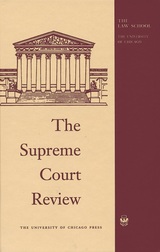
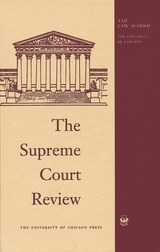
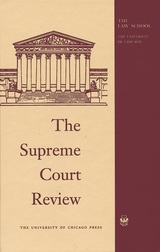
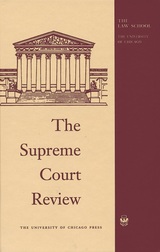
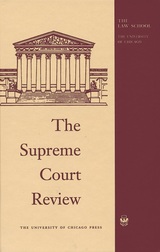
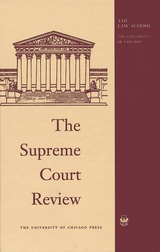
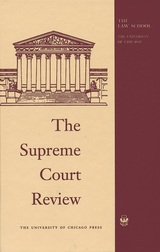
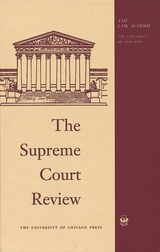
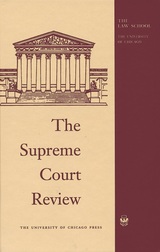
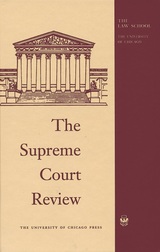
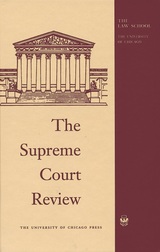
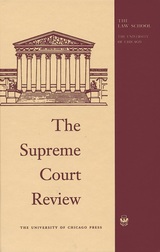
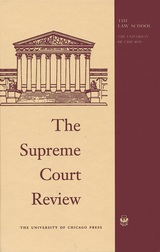
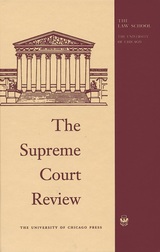
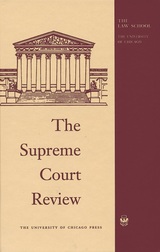
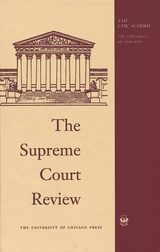
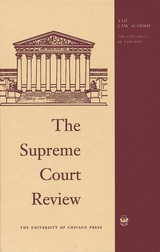
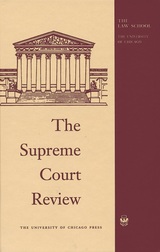
Since it first appeared in 1960, The Supreme Court Review has won acclaim for providing a sustained and authoritative survey of the implications of the Court's most significant decisions. Consisting of diverse essays by distinguished lawyers, historians, and social scientists, each volume presents informed analyses of past and present opinions and discusses important public law issues that have come under Court consideration.
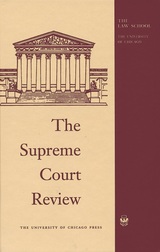
The Supreme Court Review keeps you at the forefront of the Court's most significant decisions by surveying its origins, reforms, and interpretations of American law and compelling you to consider the impacts of legal institutions and judicial opinion. Diverse essays of informed analyses of past and present opinions document the complexities of the Court and relevant public law issues. Legal scholars, lawyers, judges, historians, political scientists, economists, and journalists have won acclaim for their contributions to each volume.
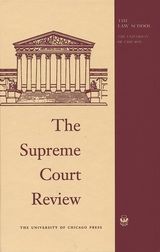
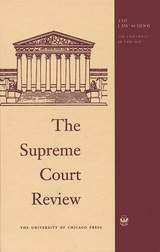
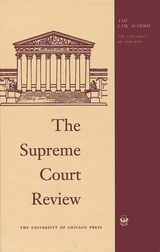
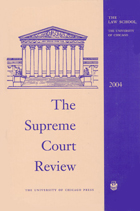
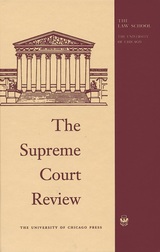
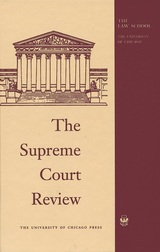
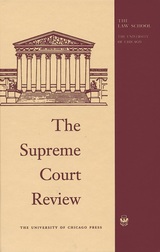
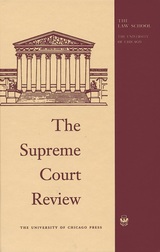
For forty-eight years, The Supreme Court Review has been lauded for providing authoritative discussion of the Court’s most significant decisions. The Review is an in-depth annual critique of the Supreme Court and its work, at the forefront of studies of the origins, reforms, and interpretations of American law. Recent volumes have considered such issues as the 2000 presidential election, cross burning, federalism and state sovereignty, the United States v. American Library Association case, failed Supreme Court nominations, and numerous First and Fourth amendment cases.

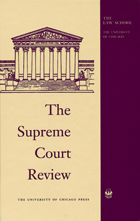
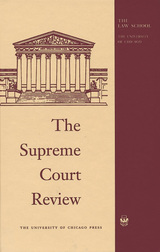
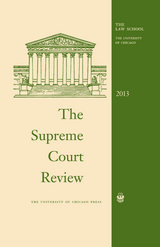
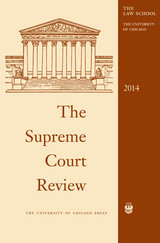
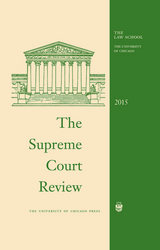
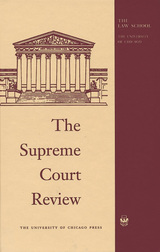
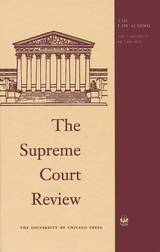
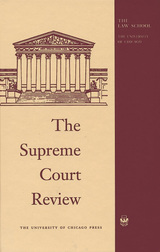
This year’s volume features prominent scholars assessing major legal events, including:
Mark Tushnet on President Trump’s “Muslim Ban”
Kate Andrias on Union Fees in the Public Sector
Cass R. Sunstein on Chevron without Chevron
Tracey Maclin on the Fourth Amendment and Unauthorized Drivers
Frederick Schauer on Precedent
Pamela Karlan on Gay Equality and Racial Equality
Randall Kennedy on Palmer v. Thompson
Lisa Marshall Manheim and Elizabeth G. Porter on Voter Suppression
Melissa Murray on Masterpiece Cakeshop
Vikram David Amar on Commandeering
Laura K. Donohue on Carpenter, Precedent, and Originalism
Evan Caminker on Carpenter and Stability
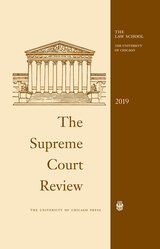
This year’s volume features incisive assessments of major legal events, including:
Gillian E. Metzger on The Roberts Court's Administrative Law
Paul Butler on Peremptory Strikes in Mississippi v. Flowers
Nicholas O. Stephanopoulos on Partisan Gerrymandering
Kent Greenfield on Hate Speech
Jennifer M. Chacon on Department of Commerce v. New York
Micah Schwartzman & Nelson Tebbe on Establishment Clause Appeasement
William Baude on Precedent and Originalism
Linda Greenhouse on The Supreme Court’s Challenge to Civil Society
James T. Kloppenberg on James Madison
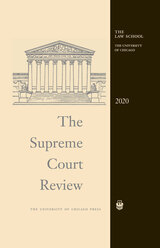
Since it first appeared in 1960, The Supreme Court Review (SCR) has won acclaim for providing a sustained and authoritative survey of the implications of the Court's most significant decisions. SCR is an in-depth annual critique of the Supreme Court and its work, keeping up on the forefront of the origins, reforms, and interpretations of American law. SCR is written by and for legal academics, judges, political scientists, journalists, historians, economists, policy planners, and sociologists.
This year’s volume features incisive assessments of major legal events, including:
Cristina M. Rodríguez on the Political Significance of Law
Martha Minow on Little Sisters of the Poor
Cass R. Sunstein and Adrian Vermeule on the Unitary Executive
Cary Franklin on Living Textualism
David A. Strauss on Sexual Orientation and the Dynamics of Discrimination
Saikrishna Bangalore Prakash on the Executive’s Privileges and Immunities
Reva B. Siegel on Abortion Restrictions
Maggie Blackhawk on McGirt v. Oklahoma
Richard J. Lazarus on Advocacy History
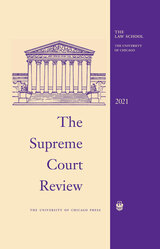
Since it first appeared in 1960, the Supreme Court Review has won acclaim for providing a sustained and authoritative survey of the implications of the Court's most significant decisions. SCR is an in-depth annual critique of the Supreme Court and its work, analyzing the origins, reforms, and modern interpretations of American law. SCR is written by and for legal academics, judges, political scientists, journalists, historians, economists, policy planners, and sociologists.
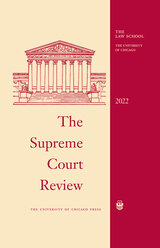
Since it first appeared in 1960, the Supreme Court Review has won acclaim for providing a sustained and authoritative survey of the implications of the Court's most significant decisions. SCR is an in-depth annual critique of the Supreme Court and its work, analyzing the origins, reforms, and modern interpretations of American law. SCR is written by and for legal academics, judges, political scientists, journalists, historians, economists, policy planners, and sociologists.

A data-rich examination of the US Supreme Court's unprecedented detachment from the democratic processes that buttress its legitimacy.
Today’s Supreme Court is unlike any other in American history. This is not just because of its jurisprudence but also because the current Court has a tenuous relationship with the democratic processes that help establish its authority. Historically, this “democracy gap” was not nearly as severe as it is today. Simply put, past Supreme Courts were constructed in a fashion far more in line with the promise of democracy—that the people decide and the majority rules.
Drawing on historical and contemporary data alongside a deep knowledge of court battles during presidencies ranging from FDR to Donald Trump, Kevin J. McMahon charts the developments that brought us here. McMahon offers insight into the altered politics of nominating and confirming justices, the shifting pool of Supreme Court hopefuls, and the increased salience of the Court in elections. A Supreme Court Unlike Any Other is an eye-opening account of today’s Court within the context of US history and the broader structure of contemporary politics.
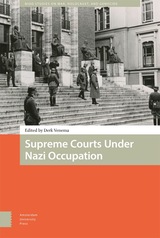
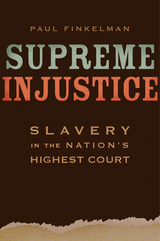
The three most important Supreme Court Justices before the Civil War—Chief Justices John Marshall and Roger B. Taney and Associate Justice Joseph Story—upheld the institution of slavery in ruling after ruling. These opinions cast a shadow over the Court and the legacies of these men, but historians have rarely delved deeply into the personal and political ideas and motivations they held. In Supreme Injustice, the distinguished legal historian Paul Finkelman establishes an authoritative account of each justice’s proslavery position, the reasoning behind his opposition to black freedom, and the incentives created by circumstances in his private life.
Finkelman uses census data and other sources to reveal that Justice Marshall aggressively bought and sold slaves throughout his lifetime—a fact that biographers have ignored. Justice Story never owned slaves and condemned slavery while riding circuit, and yet on the high court he remained silent on slave trade cases and ruled against blacks who sued for freedom. Although Justice Taney freed many of his own slaves, he zealously and consistently opposed black freedom, arguing in Dred Scott that free blacks had no Constitutional rights and that slave owners could move slaves into the Western territories. Finkelman situates this infamous holding within a solid record of support for slavery and hostility to free blacks.
Supreme Injustice boldly documents the entanglements that alienated three major justices from America’s founding ideals and embedded racism ever deeper in American civic life.
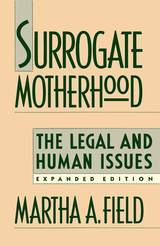
With an Expanded Appendix on the Current Legal Status of Surrogacy Arrangements
A practice known since Biblical times, surrogate motherhood has only recently leaped to prominence as a way of providing babies for childless couples—and leaped to notoriety through the dramatic case of Baby M. Contract surrogacy is officially little more than ten years old, but by 1986 five hundred babies had been born to mothers who gave them up to sperm donor fathers for a fee, and the practice is growing rapidly. Martha Field examines the myriad legal complexities that today enmesh surrogate motherhood, and also looks beyond existing legal rules to ask what society wants from surrogacy.
A man’s desire to be a “biological” parent even when his wife is infertile—the father’s wife usually adopts the child—has led to this new kind of family, and modern technology could further extend surrogacy’s appeal by making gestational surrogates available to couples who provide both egg and sperm. But is surrogacy a form of babyselling? Is the practice a private matter covered by contract law, or does adoption law govern? Is it good or bad social and public policy to leave surrogacy unregulated? Should the law allow, encourage, discourage, or prohibit surrogate motherhood? Ultimately the answers will depend on what the American public wants.
In the difficult process of sorting out such vexing questions, Martha Field has written a landmark book. Showing that the problem is rather too much applicable law than too little, she discusses contract law and constitutional law, custody and adoption law, and the rights of biological fathers as well as the laws governing sperm donation. Competing values are involved all along the legal and social spectrum. Field suggests that a federal prohibition would be most effective if banning surrogacy is the aim, but federal prohibition might not be chosen for a variety of reasons: a preference for regulating surrogacy instead of driving it underground; a preference for allowing regulation and variation by state; or a respect for the interests of people who want to enter surrogacy arrangements. Since the law can support a wide variety of positions, Field offers one that seems best to reconcile the competing values at stake. Whether or not paid surrogacy is made illegal, she suggests that a surrogate mother retain the option of abiding by or canceling the contract up to the time she freely gives the child to the adopting couple. And if she cancels the contract, she should be entitled to custody without having to prove in court that she would be a better parent than the father.
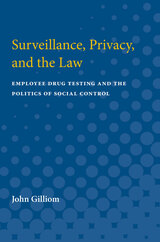
Drawing on theories of ideological hegemony and legal mobilization, John Gilliom begins the search for answers with an examination of how the imagery of a national drug crisis served as the legitimating context for the introduction of testing. Surveillance, Privacy, and the Law then moves beyond the specific history of testing and frames the new policy within a broader transformation of social control policy seen by students of political economy, society, and culture. The book cites survey research among skilled workers and analyzes court opinions to highlight the sharply polarized opinions in the workplaces and courthouses of America. Although federal court decisions show massive and impassioned disagreement among judges, the new conservative Supreme Court comes down squarely behind testing. Its ruling embraces surveillance technology, rejects arguments against testing, and undermines future opposition to policies of general surveillance.
Surveillance, Privacy, and the Law portrays the apparent triumph of testing policies as a victory for the conservative law-and-order movement and a stark loss for the values of privacy and autonomy. As one episode in a broader move toward a surveillance society, the battle over employee drug testing raises disturbing questions about future struggles over revolutionary new means of surveillance and control.
John Gilliom is Professor of Political Science, Ohio University.
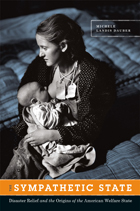
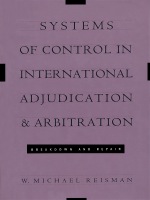
Reisman considers three major forms of international arbitration: in the International Court; under the auspices of the World Bank; and under the New York Convention of 1958. He discusses the unique structures of control in each situation as well as the stresses they have sustained. Drawing on extensive research and his own experience as a participant in the resolution of some of the disputes discussed, Reisman analyzes recent key decisions, including: Australia and New Zealand's attempt to stop France's nuclear testing in Muroroa; AMCO vs. Republic of Indonesia, concerning the construction of a large tourist hotel in Asia; and numerous others.
Reisman explores the implications of the breakdown of control systems and recommends methods of repair and reconstruction for each mode of arbitration. As a crucial perspective and an invaluable guide, this work will benefit both scholars and practitioners of international dispute resolution.
READERS
Browse our collection.
PUBLISHERS
See BiblioVault's publisher services.
STUDENT SERVICES
Files for college accessibility offices.
UChicago Accessibility Resources
home | accessibility | search | about | contact us
BiblioVault ® 2001 - 2024
The University of Chicago Press









